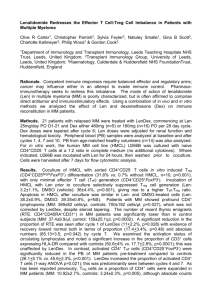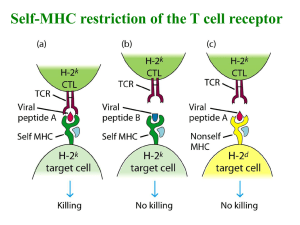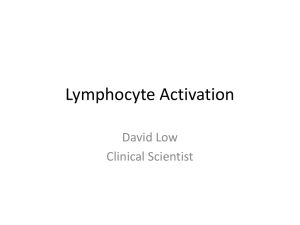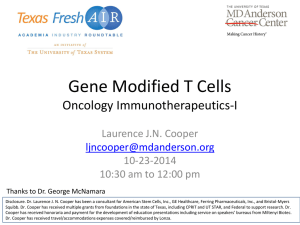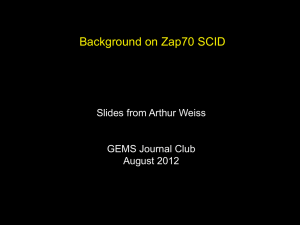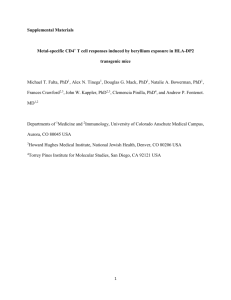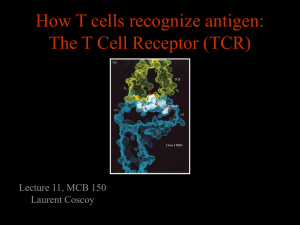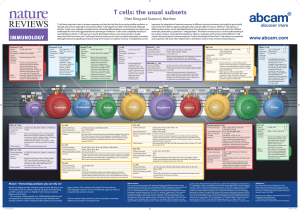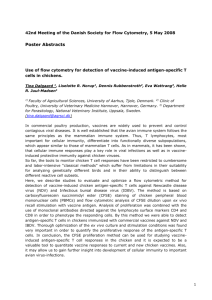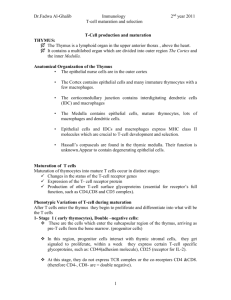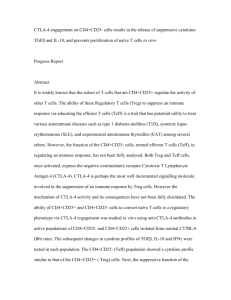Slide competition - Scandinavian Society of Immunology
advertisement
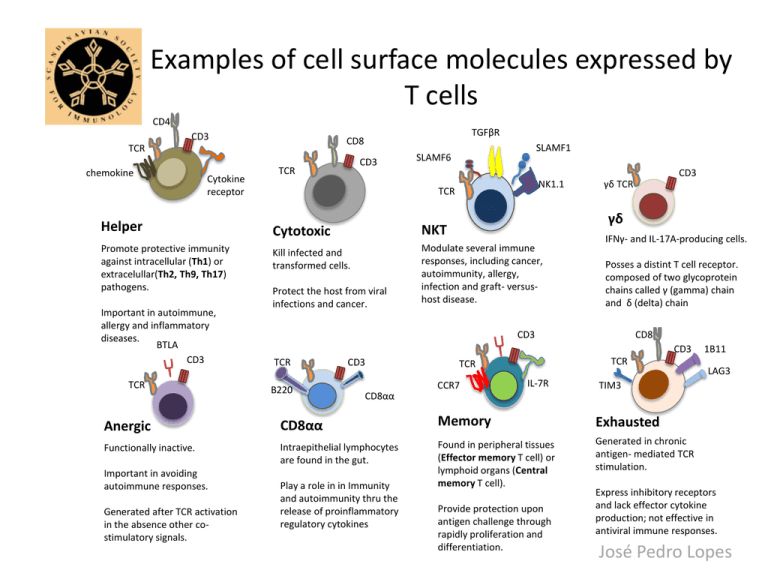
Examples of cell surface molecules expressed by T cells CD4 CD3 TCR chemokine Cytokine receptor Helper Promote protective immunity against intracellular (Th1) or extracelullar(Th2, Th9, Th17) pathogens. Important in autoimmune, allergy and inflammatory diseases. BTLA CD3 TCR TGFβR CD8 CD3 TCR SLAMF1 SLAMF6 CD3 NK1.1 TCR γδ Cytotoxic NKT Kill infected and transformed cells. Modulate several immune responses, including cancer, autoimmunity, allergy, infection and graft- versushost disease. Protect the host from viral infections and cancer. γδ TCR IFNγ- and IL-17A-producing cells. Posses a distint T cell receptor. composed of two glycoprotein chains called γ (gamma) chain and δ (delta) chain CD44 CD8 CD3 CD3 TCR B220 CD3 TCR TCR CCR7 IL-7R TIM3 CD8αα Memory Exhausted Functionally inactive. Intraepithelial lymphocytes are found in the gut. Found in peripheral tissues (Effector memory T cell) or lymphoid organs (Central memory T cell). Generated in chronic antigen- mediated TCR stimulation. Generated after TCR activation in the absence other costimulatory signals. LAG3 CD8αα Anergic Important in avoiding autoimmune responses. 1B11 Play a role in in Immunity and autoimmunity thru the release of proinflammatory regulatory cytokines Provide protection upon antigen challenge through rapidly proliferation and differentiation. Express inhibitory receptors and lack effector cytokine production; not effective in antiviral immune responses. José Pedro Lopes Treg population CD4 TCR CD25 TR1 cell Natural TReg cell Inducible TReg cell Surface phenotype αβ TCR, CD3, CD4 Surface phenotype αβ TCR, CD3, CD4, CD25, CTLA4, GITR Surface phenotype αβ TCR, CD3, CD4, CD25, CTLA4, GITR Effector molecules IL-10 Effector molecules IL-10, TGFβ, IL-35 Effector molecules IL-10, TGFβ Function Derived from naïve T cells by immunosuppressive drugs or TGF-β and IL-27. Function Immunosuppression and tolerance through contact-dependent and independent mechanisms. Function Mediate immunosuppression and tolerance by contact-dependent and independent mechanisms Originate in the thymus. Generated from naïve T cells in the periphery. CD3 CTLA4 GITR Mediate immunosuppression and tolerance responses. By suppression or down regulation of induction and proliferation of effector T cells José Pedro Lopes Differentiation of Naïve CD4+ T Cells into TReg Bone marrow CD4+CD8- Thymus FoxP3 CD25+ Natural FoxP3 TReg CD25- Induced FoxP3 TReg Il-2, RA, TGF-β Naïve T-cell Teffector José Pedro Lopes Modulation of T cell response by TREG upon Infection PRR MHC CLASS II TCR DC CD80/ CD86 CD28 Naïve T-cell MΦ Naïve T-cell differentiate into either CD4+ or CD8+ effector T-cells Th1 TReg help to control Th1-type excessive response e.g infection triggered inflammation Th2 TReg help to control Th2-type excessive response e.g pathogen triggered allergic reaction pathogen CD8+ Tcell TReg help to control CD8+ excessive killing host cells TReg Th17 Neutrophil TReg help to control Th17-type excessive response e.g autoimmunity José Pedro Lopes

